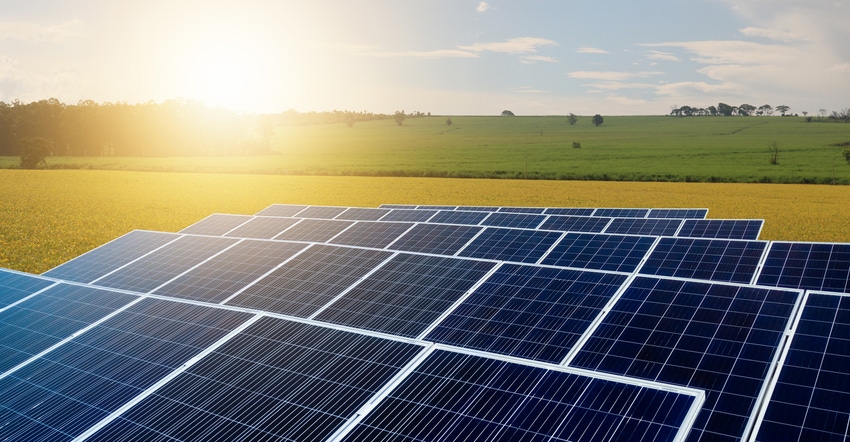
Farmers across the country continue to see interest from solar energy companies to enter long-term leases. These types of renewable energy projects create opportunities and challenges for landowners.
For the most part, companies are looking for land near transmission lines and substations. Projects typically cover at least 25 acres as companies look to secure roughly 5 acres per megawatt, according to the University of Missouri Extension publication titled “Leasing Land for Solar Energy Development.”
Before you sign a contract, here are six takeaways on how solar leases can impact your farm:
1. Land constraints with a solar lease. Solar energy land leases are often written for 20 years or more, with options to renew. Given the length of time, these agreements could tie up land use for the next generation. Consider talking with family members before signing. Determine if this type of lease is in line with your farm goals.
2. Land impacts from solar contracts. Construction of a solar farm may require site access. You may be required to add a road to allow access for concrete trucks, semitrailers and other heavy equipment. The report states that this type of disturbance may cause subsurface compaction and potentially impact surface and subsurface drainage. However, you can expect less land disturbance after completion.
3. Solar energy company equipment responsibility. What happens when the lease is up or perhaps the company goes under? The lease should specify who is responsible for removing the solar equipment. You need to include how the equipment is removed and how you want the land renovated.
4. Farm financial considerations with solar leases. A utility-scale solar lease could have both positive and negative impacts of farm profitability, according to the report. The returns per acre from the lease may exceed farm enterprise returns, which could create greater cash flow. However, removing land from production can require finding additional grazing land or crop acres.
A solar energy lease may have positive or negative impacts on a farm's borrowing capacity and relationship with ag lenders. Lenders may view increased cash flows from solar energy leases as potentially improving debt repayment capacity. But lenders may be unwilling to accept land leased for solar energy development as loan collateral. You need to communicate with your lender before signing a contract.
5. Legal ramifications of renewable contracts. There are several legal considerations, including land title and ownership. Energy developers typically request that landowners sign multiple documents. The three most common are:
Letter of intent. This commonly limits the landowner's right to negotiate with other developers. The letter may or may not be legally binding.
Option to lease. This is a legally binding agreement in which the landowner grants the developer the right to lease the land. The time period should be specified and may include the payment terms on an annual per-acre rate, liability and tax responsibilities, renewal terms, removal bond and more.
Actual lease or purchase agreement. Sign documents only when all terms and conditions are fully understood.
6. Tax implications from solar energy systems. Currently, solar energy systems not held for resale are exempt from state, county and local taxes. However, laws could change how these installations affect property tax assessment. Also, changing land use may affect tax rates.
Farmers and landowners should seek the advice of an attorney experienced in reviewing solar energy leases to understand lease terms and conditions. Accountants and farm advisers can also help you understand how solar energy lease proposals affect your land, farm and family.
For more information, visit the MU Extension publication titled “Leasing Land for Solar Energy Development” online or contact your local county Extension office.
About the Author(s)
You May Also Like






